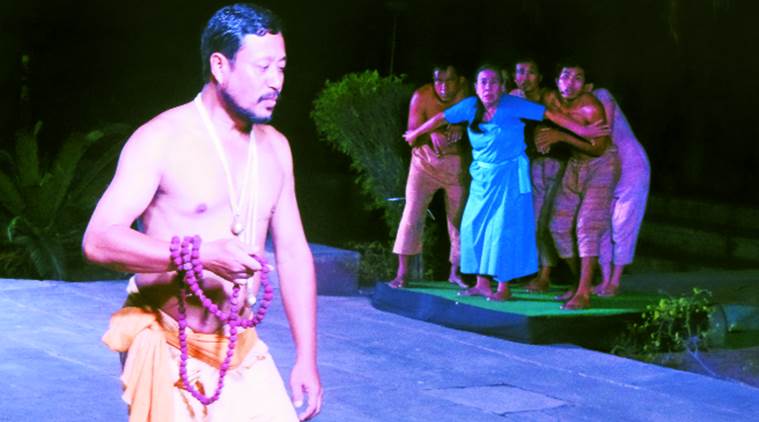Epic Journeys
Classics by KN Panikkar and H Kanhailal to open the Bharat Rang Mahotsav
 A scene from Pebet
A scene from Pebet
Manipuri director Heisnam Kanhailal’s searing play about cultural and religious indoctrination, Pebet, will be staged on the second day of the 19th Bharat Rang Mahotsav. The theatre festival will pay tribute to two veteran directors, Kanhailal and KN Panikkar, who died last year, by revisiting their classic plays. Pebet is among the most powerful political plays on the festival calendar. It is named after a tiny bird, smaller than a sparrow and almost extinct, about which there is a folk tale in Manipur.
“Kanhailal created Pebet without a written dramatic text but, through improvisation, it becomes a powerful work of physical theatre. In the story, a mother Pebet is guarding her nest from a cat that wants to eat her children. Kanhailal dressed the cat as a saffron-clad monk to symbolise the ‘Hinduisation and Sanskritisation’ of Manipuri culture that was taking place around 1975-76, when the play was staged,” says Rojio Usham of the group Kalakshetra Manipur. The director also, famously, introduced a dream sequence which became a point of departure from the folktale as well as a stark political intervention on indoctrination.
The opening day features Panikkar’s Uttara Rama Charitham, in which Rama stands at the crossroads of being an ideal king and an ideal husband. “When the washerman casts aspersions on Sita’s character, he has to pay heed to the people’s thoughts but the husband in him does not want to send Sita to the forest,” says Kalyani Krishnan, secretary of Panikkar’s group Sopanam. Madhyamavyayogam, which will be staged on February 2, is a landmark production that premiered in 1978.
Playwright Bhasa’s story, which takes off from the Mahabharata and deals with the madhyama or the middle child syndrome, marked Panikkar’s debut in Sanskrit plays. In the story, Ghatotkachh wants a Brahmin family to give up one of their sons to feed his mother Hidimba. “The father loves the eldest son while the mother pulls the youngest son to herself. This leaves the second son, Madhyama, who offers himself as the sacrifice,” says Krishnan.
Photos




- 01
- 02
- 03
- 04
- 05
























